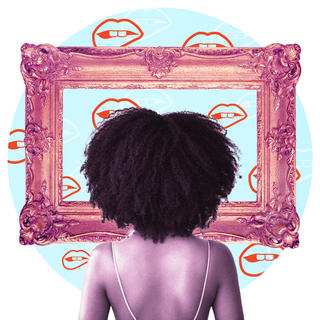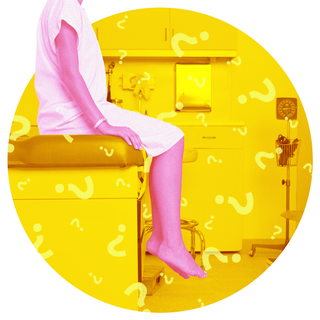You Roommate is scoring on Hinge. Your bestie, who’s been in a relationship for basically forever, can't stop talking about the crazy new BDSM move her boyfriend showed her. And your mom (your mom) bought herself a clit vibrator.
When all the signs around you scream, "Everyone's having tons of hot sex!" it can make you feel even more self-conscious about the fact that you, well, just don't want to. Holly Richmond, Ph.D., a certified sex therapist with offices in California, Portland and the greater New York City area, estimates that 30 to 40 percent of her clientele are women who come to her saying, "I don't want to have sex. Am I normal? Am I weird? Why am I different?"

In a recent survey* of 1,686 women ages 25 to 49, more than three in five respondents said they've personally experienced one or more symptoms of sexual dysfunction, including not being in the mood for unknown reasons on a regular basis, and making frequent excuses to avoid a sex sesh. Among those women, a whopping 91 percent said this was taking a negative emotional toll on their lives, mainly in the form of self-consciousness, disappointment, and feeling awkward.
Translation: Not only are too many women missing out on the big Os, intimacy, and countless other benefits of sex on the reg, they're also feeling crappy and embarrassed by it.
And what those feelings do, Richmond says, is just perpetuate the cycle. "Now you're in your head: 'Does my partner think I'm broken?' 'Am I the only woman in the world who doesn't want to have sex?'—and you won’t even take that step toward sex because you've already talked yourself out of it."
And as we all know, if you’re not feeling good about yourself, you’re probably not going to be up for sexy time.
You’re not alone, and you're certainly not doomed to be stuck in this insecure headspace forever. Here's how to turn things around.
Try practicing mindfulness (in bed).
Feeling embarrassed about your sex drive is enough to ax whatever steamy feelings you have. Then, there's all of life's other stresses—deadlines, relationship anxiety, body image issues, financial difficulties—infiltrating your mind. That stress can def sneak into the bedroom: Forty-three percent of the aforementioned survey respondents cited stress as the number one reason for their sexual dysfunction; 41 percent ID'ed body confidence and self-esteem issues.

So, start by trying for a little mindfulness while you're getting busy. Richmond encourages clients to "get out of their head and into their body." After all, if you're obsessing over what your partner thinks about your cellulite, or why you don't want to screw on the kitchen floor like Emmy Rossum in Shameless, you probs won't notice the *OMG* way his hand feels on your thigh or her lips against your neck.
To help anchor yourself in the present, Richmond suggests trying to notice three sights, sounds, or smells around you—the scent of your white tea candle, the Camila Cabello song playing, the color of your partner's eyes.
DIY it up.
Another fab option, according to Richmond: Masturbation. For one thing, you'll feel more present because "you're not worrying about things like whether you look, sound, or taste right," Richmond says. But also, thanks to a combination of hormones and neurotransmitters released during orgasm, "the more sex we have, the more sex we tend to want," making self-pleasure a lower pressure way of dipping your toe back into the sex pool.
Go to Pleasuretown elsewhere.
Too intimidated for sex at the moment? That's fine! Instead, Richmond recommends working on finding passion in your everyday life. "I'll often ask women, 'Where do you experience pleasure that's non-sexual?' and I'll get a blank stare for 30 seconds, because as women with partners and a job, and sometimes kids or aging parents, our pleasure isn't prioritized."

So ask yourself, "What else brings me pleasure?" Maybe you get mentally "turned on" by art or cooking or exercise. Tap into that, Richmond says, and with some time, you may find your passion making its way downtown.
Try to remember this isn't your fault.
Alexandra Stockwell, MD, a physician-turned-relationship and intimacy expert in the San Francisco Bay Area, says it's normal for sex drive to ebb and flow. “We all have various seasons in our sexual desire. Sometimes it’s spring and summer, and sometimes it’s fall or winter.” Stockwell says that regularly not being in the mood can be a symptom of depression, a thyroid condition, a hormonal imbalance, or a side effect of certain antidepressants or anti-anxiety medications. Or, it may be a sign of hypoactive sexual desire disorder (HSSD), a condition characterized by a chronically low sex drive that—and this is a key feature—causes the person distress.
These are all medical or psychological conditions, but research out of the University of Chicago found that just 40 percent of U.S. ob-gyns routinely ask patients about sexual dysfunction. Even fewer regularly inquire about satisfaction. That means you might need to take a deep breath and bring it up yourself, which can be really intimidating—especially if you're already feeling self-conscious, Richmond acknowledges. But trust that health care providers are your advocates.
Do it at your annual exam with your ob-gyn or internist, or make a special appointment. It may feel easier to baby-step into the conversation with, "I've been noticing X, Y, Z about my sex drive. I wonder if it might be physiological or psychological?"

Your doctor can lead from there. They'll probably ask about your general and mental health, including sources of stress and fatigue, and do a physical exam. They may also ask a series of questions designed to help diagnose HSDD, including: "In the past, was your level of sexual desire good and satisfying to you?" and "Are you bothered by your decreased level of sexual desire/interest?" (The good news: HSDD is treatable, and so are many of the conditions commonly responsible for low sex drive.)
If you want to find a sex therapist, check out the International Society for Women's Sexual Health or the American Association of Sexuality Educators, Counselors and Therapists. Trust us, they've heard it all, so meeting with one may help you feel less isolated and less uncomfortable, and could help you learn all sorts of tips and tricks to pump up your confidence and get back in touch with your sexual self.
Ask your friends for a confidence boost.
Not only are we not discussing low sex drive with our doctors, but we're also keeping it on the DL around friends and partners, too. Forty-four percent of respondents in our survey said they haven't discussed their sexual dysfunction with someone else. Reasons ranged from "I've learned to just live with it" to "I figured at some point I'd feel normal."
Richmond says it's also standard to feel self-conscious when you hear your friends gushing about their steamy sex lives, especially when it sounds so polar opposite to what you're experiencing yourself.

But, come on: You've got friends who are always there for you, so reach out to them. Start the convo with, "I trust you and need to share this with someone,” then spill, just as you would when having a heart-to-heart on any important topic. While your BFF might not be a therapist or a doctor, the simple act of unloading could help lift the feeling of shame.
Get some info from your partner.
With the person you actually want to get busy with, try this no-fail conversation starter: "I'm curious: What do you think about our sex life?" Be direct. "The words 'I'm curious' open the door in a way that avoids any shaming and doesn't put either partner on the defense," Richmond says. Maybe your S.O. has been feeling self-conscious, too, and this can put you on the road to a fix together.
Be proud of yourself for having the courage to bring it up. And above all, Richmond says, "Don't feel weird or broken. You're not."
*Survey was conducted by Women's Health & Cosmopolitan, in partnership with a pharmaceutical company that sells a drug to treat hypoactive sexual desire disorder (HSDD).



You must be logged in to post a comment.